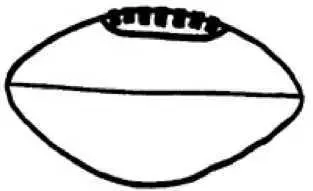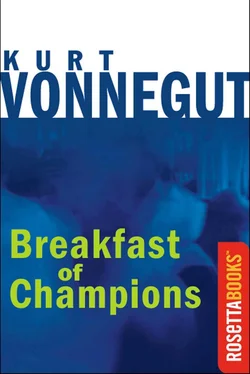Kurt Vonnegut - Breakfast of Champions
Здесь есть возможность читать онлайн «Kurt Vonnegut - Breakfast of Champions» весь текст электронной книги совершенно бесплатно (целиком полную версию без сокращений). В некоторых случаях можно слушать аудио, скачать через торрент в формате fb2 и присутствует краткое содержание. Жанр: Современная проза, на английском языке. Описание произведения, (предисловие) а так же отзывы посетителей доступны на портале библиотеки ЛибКат.
- Название:Breakfast of Champions
- Автор:
- Жанр:
- Год:неизвестен
- ISBN:нет данных
- Рейтинг книги:4 / 5. Голосов: 1
-
Избранное:Добавить в избранное
- Отзывы:
-
Ваша оценка:
- 80
- 1
- 2
- 3
- 4
- 5
Breakfast of Champions: краткое содержание, описание и аннотация
Предлагаем к чтению аннотацию, описание, краткое содержание или предисловие (зависит от того, что написал сам автор книги «Breakfast of Champions»). Если вы не нашли необходимую информацию о книге — напишите в комментариях, мы постараемся отыскать её.
Breakfast of Champions — читать онлайн бесплатно полную книгу (весь текст) целиком
Ниже представлен текст книги, разбитый по страницам. Система сохранения места последней прочитанной страницы, позволяет с удобством читать онлайн бесплатно книгу «Breakfast of Champions», без необходимости каждый раз заново искать на чём Вы остановились. Поставьте закладку, и сможете в любой момент перейти на страницу, на которой закончили чтение.
Интервал:
Закладка:
Patty Keene actually imagined Dwayne’s waving a magic wand at her troubles and dreams. It looked like this:

She spoke up bravely, to learn if supernatural assistance was possible in her case. She was willing to do without it, expected to do without it—to work hard all her life, to get not much in return, and to associate with other men and women who were poor and powerless, and in debt. She said this to Dwayne: “Excuse me for calling you by name, Mr. Hoover, but I can’t help knowing who you are, with your picture in all your ads and everything. Besides—everybody else who works here told me who you were. When you came in, they just buzzed and buzzed.”
“Buzzed,” said Dwayne. This was his echolalia again.
“I guess that isn’t the right word,” she said. She was used to apologizing for her use of language. She had been encouraged to do a lot of that in school. Most white people in Midland City were insecure when they spoke, so they kept their sentences short and their words simple, in order to keep embarrassing mistakes to a minimum.
Dwayne certainly did that. Patty certainly did that.
This was because their English teachers would wince and cover their ears and give them flunking grades and so on whenever they failed to speak like English aristocrats before the First World War. Also: they were told that they were unworthy to speak or write their language if they couldn’t love or understand incomprehensible novels and poems and plays about people long ago and far away, such as Ivanhoe.
The black people would not put up with this. They went on talking English every which way. They refused to read books they couldn’t understand—on the grounds they couldn’t understand them. They would ask such impudent questions as, “Whuffo I want to read no Tale of Two Cities? Whuffo?”
Patty Keene flunked English during the semester when she had to read and appreciate Ivanhoe, which was about men in iron suits and the women who loved them. And she was put in a remedial reading class, where they made her read The Good Earth, which was about Chinamen.
It was during this same semester that she lost her virginity. She was raped by a white gas-conversion unit installer named Don Breedlove in the parking lot outside the Bannister Memorial Fieldhouse at the County Fairgrounds after the Regional High School Basketball Playoffs. She never reported it to the police. She never reported it to anybody, since her father was dying at the time.
There was enough trouble already.
The Bannister Memorial Fieldhouse was named in honor of George Hickman Bannister, a seventeen-year-old boy who was killed while playing high school football in 1924. George Hickman Bannister had the largest tombstone in Calvary Cemetery, a sixty-two-foot obelisk with a marble football on top.
The marble football looked like this:

Football was a war game. Two opposing teams fought over the ball while wearing armor made out of leather and cloth and plastic.
George Hickman Bannister was killed while trying to get a hold of the ball on Thanksgiving Day. Thanksgiving Day was a holiday when everybody in the country was expected to express gratitude to the Creator of the Universe, mainly for food.
George Hickman Bannister’s obelisk was paid for by public subscription, with the Chamber of Commerce matching every two dollars raised with a dollar of its own. It was for many years the tallest structure in Midland City. A city ordinance was passed which made it illegal to erect anything taller than that, and it was called The George Hickman Bannister Law.
The ordinance was junked later on to allow radio towers to go up.
The two largest monuments in town, until the new Mildred Barry Memorial Arts Center went up in Sugar Creek, were constructed supposedly so that George Hickman Bannister would never be forgotten. But nobody ever thought about him anymore by the time Dwayne Hoover met Kilgore Trout. There wasn’t much to think about him, actually, even at the time of his death, except that he was young.
And he didn’t have any relatives in town anymore. There weren’t any Bannisters in the phone book, except for The Bannister, which was a motion picture theater. Actually, there wouldn’t even be a Bannister Theater in there after the new phonebooks came out. The Bannister had been turned into a cut-rate furniture store.
George Hickman Bannister’s father and mother and sister, Lucy, moved away from town before either the tombstone or the fieldhouse was completed, and they couldn’t be located for the dedication ceremonies.
It was a very restless country, with people tearing around all the time. Every so often, somebody would stop to put up a monument.
There were monuments all over the country. But it was certainly unusual for somebody from the common people to have not one but two monuments in his honor, as was the case with George Hickman Bannister.
Technically, though, only the tombstone had been erected specifically for him. The fieldhouse would have gone up anyway. The money was appropriated for the fieldhouse two years before George Hickman Bannister was cut down in his prime. It didn’t cost anything extra to name it after him.
Calvary Cemetery, where George Hickman Bannister was at rest, was named in honor of a hill in Jerusalem, thousands of miles away. Many people believed that the son of the Creator of the Universe had been killed on that hill thousands of years ago.
Dwayne Hoover didn’t know whether to believe that or not. Neither did Patty Keene.
And they certainly weren’t worrying about it now. They had other fish to fry. Dwayne was wondering how long his attack of echolalia was likely to last, and Patty Keene had to find out if her brand-newness and prettiness and outgoing personality were worth a lot to a sweet, sort of sexy, middle-aged old Pontiac dealer like Dwayne.
“Anyway,” she said, “it certainly is an honor to have you visit us, and those aren’t the right words, either, but I hope you know what I mean.”
“Mean,” said Dwayne.
“Is the food all right?” she said.
“All right,” said Dwayne.
“It’s what everybody else gets,” she said. “We didn’t do anything special for you.”
“You,” said Dwayne.
It didn’t matter much what Dwayne said. It hadn’t mattered much for years. It didn’t matter much what most people in Midland City said out loud, except when they were talking about money or structures or travel or machinery—or other measurable things. Every person had a clearly defined part to play—as a black person, a female high school drop-out, a Pontiac dealer, a gynecologist, a gas-conversion burner installer. If a person stopped living up to expectations, because of bad chemicals or one thing or another, everybody went on imagining that the person was living up to expectations anyway.
That was the main reason the people in Midland City were so slow to detect insanity in their associates. Their imaginations insisted that nobody changed much from day to day. Their imaginations were flywheels on the ramshackle machinery of the awful truth.
When Dwayne left Patty Keene and his Burger Chef, when he got into his demonstrator and drove away, Patty Keene was persuaded that she could make him happy with her young body, with her bravery and cheerfulness. She wanted to cry about the lines in his face, and the fact that his wife had eaten Dr,no, and that his dog had to fight all the time because it couldn’t wag its tail, about the fact that his son was a homosexual. She knew all those things about Dwayne. Everybody knew those things about Dwayne.
Читать дальшеИнтервал:
Закладка:
Похожие книги на «Breakfast of Champions»
Представляем Вашему вниманию похожие книги на «Breakfast of Champions» списком для выбора. Мы отобрали схожую по названию и смыслу литературу в надежде предоставить читателям больше вариантов отыскать новые, интересные, ещё непрочитанные произведения.
Обсуждение, отзывы о книге «Breakfast of Champions» и просто собственные мнения читателей. Оставьте ваши комментарии, напишите, что Вы думаете о произведении, его смысле или главных героях. Укажите что конкретно понравилось, а что нет, и почему Вы так считаете.










